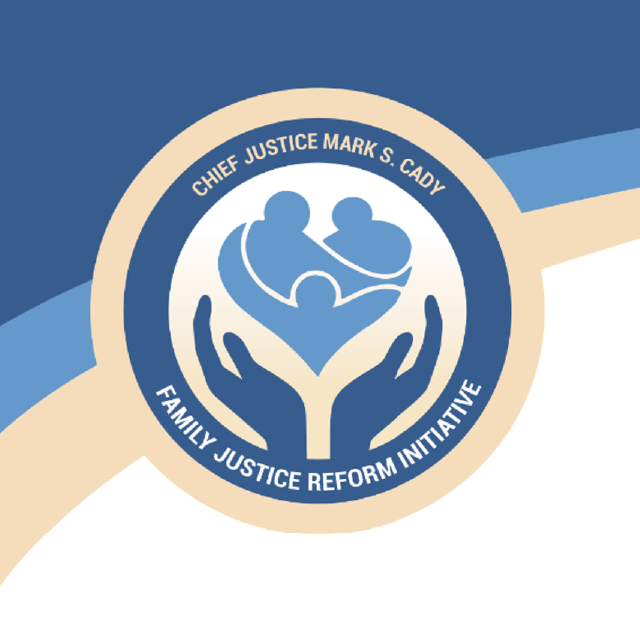We have long known that family matters challenge a court system that assumes people will be represented by attorneys and that proceedings should be adversarial.
The Cady Initiative for Family Justice Reform (formerly “Family Justice Initiative”) exists to guide courts towards improved outcomes for families, while managing costs and controlling delays. First funded by the State Justice Institute (SJI) in 2017, the Cady Initiative represents a partnership between National Center for State Courts (NCSC); IAALS, the Institute for the Advancement of the American Legal System; the Association of Family and Conciliation Courts (AFCC); and the National Council of Juvenile and Family Court Judges (NCJFCJ).
In 2018, The Cady Initiative for Family Justice Reform released the Landscape of Domestic Relations showing that either the petitioner and/or respondent are self-represented in as many as 86% of cases. Three years later, courts report amplified challenges, in part due to pandemic conditions. Caseload backlogs have increased while staffing has decreased due to vacancies or changes in responsibilities. Arkansas, Wyoming and South Carolinaare three courts that, over the last year, have overseen family law trainings intended to address the reality of how families are using courts, and to provide a path forward. Below follows a description of each state’s efforts.
Arkansas
In May 2021, the Arkansas Office of the Courts held its annual conference on children and family matters via Zoom. Attendees were primarily guardians ad litem for child welfare and domestic relations, with attendance also from judges, parents’ counsel, and other attorneys in private practice. This training event was an opportunity to consider the nature of family law, and to begin a conversation about some of the Family Justice Principles.
Wyoming
In July 2021, Professor and Director of the Family and Child Legal Advocacy Clinic at the University of Wyoming College of Law, Dona Playton, hosted a session on Innovations in Family Law at the Wyoming Trial Lawyers statewide conference to consider innovations in Access to Justice and family law reform. Attended by judges and attorneys statewide, the session focused on processes that promote healthier outcomes for families in the courts.
The session discussed examples from courts across the country on how to successfully implement pathways and innovations in family law, including in-person and virtual services, ensuring that court users can access services in the manner that is most appropriate to their needs. Examples can be found in IAALS’ Pandemic Positives: Extending the Reach of Court and Legal Services a report that highlights a number of these courts and their journey toward providing both in-person and virtual services as well as other documents published by the Cady Initiative partners (NCSC, AFCC, IAALS and NCJFCJ).
South Carolina
The South Carolina Bar has recently hired a Pro Bono Program Director, Betsy Goodale, and the South Carolina Supreme Court hired a new Executive Director of the South Carolina Access to Justice Commission, Hannah Honeycutt. During their statewide listening tour, Family Court Judges and Clerks of Court across the states reported that the Family Courts have been heavily impacted by the number of self-represented litigants. A committee began planning a Family Court Summit to take place in March 2022. The goals of this initial gathering are to recognize the issues the Family Court is facing in order to brainstorm potential solutions, and to discuss next steps.
The announcement of the Family Court Summit has been met with appreciation from the South Carolina Supreme Court, South Carolina Court Administration, Family Court Judges, Clerks of Court, and practitioners, both private sector and from legal aid organizations.
Judicial Education Offerings
In August 2020, Conference of Chief Justices and Conference of State Court Administrators (CCJ/COSCA) signed into effect Resolution 4 In Support of a Call to Action to Redesign Justice Processes for Families, setting forth these six “Big Ideas” to redesign family justice processes:
1. Ensure that family law matters receive the same level of prestige and respect as other court matters by providing them with appropriate recognition, training, funding, and strong leadership.
2. Aggressively triage cases at the earliest opportunity
3. Simplify court procedures so that self-represented parties know what to expect, understand how to navigate the process, can meaningfully engage in the justice system, and are treated fairly
4. Ensure that self-help information and services are available both in person and remotely so that all litigants can access the full range of court self-help in the manner that is most appropriate for their needs
5. Offer families a choice of dispute resolution options to promote problem-solving and to minimize the negative effects that the adversarial process has on families during the court process and afterwards
6. Promote the well-being of families, including implementation of trauma-responsive practices for families and staff, throughout the life of their case and as the primary desired case outcome
For successful implementation of the Family Justice Principles, court leaders must drive improvement efforts, acknowledging that the road may be long and that the court needs support from the larger community. The family court needs judges who exhibit strong leadership, advocate for ample training and resources and work with family law professionals for the benefit of children and families coming before the court. As a joint effort between the National Center for State Courts (NCSC), Institute for the Advancement of the American Legal System (IAALS), the National Council of Juvenile and Family Court Judges (NCJFCJ) and Association of Family and Conciliation Courts (AFCC), courses on the concepts above are available at no cost to courts as part of these organization’s commitment to help courts realize change. For more information on how your court can take part in these opportunities, please contact Alicia Davis (adavis@ncsc.org).



